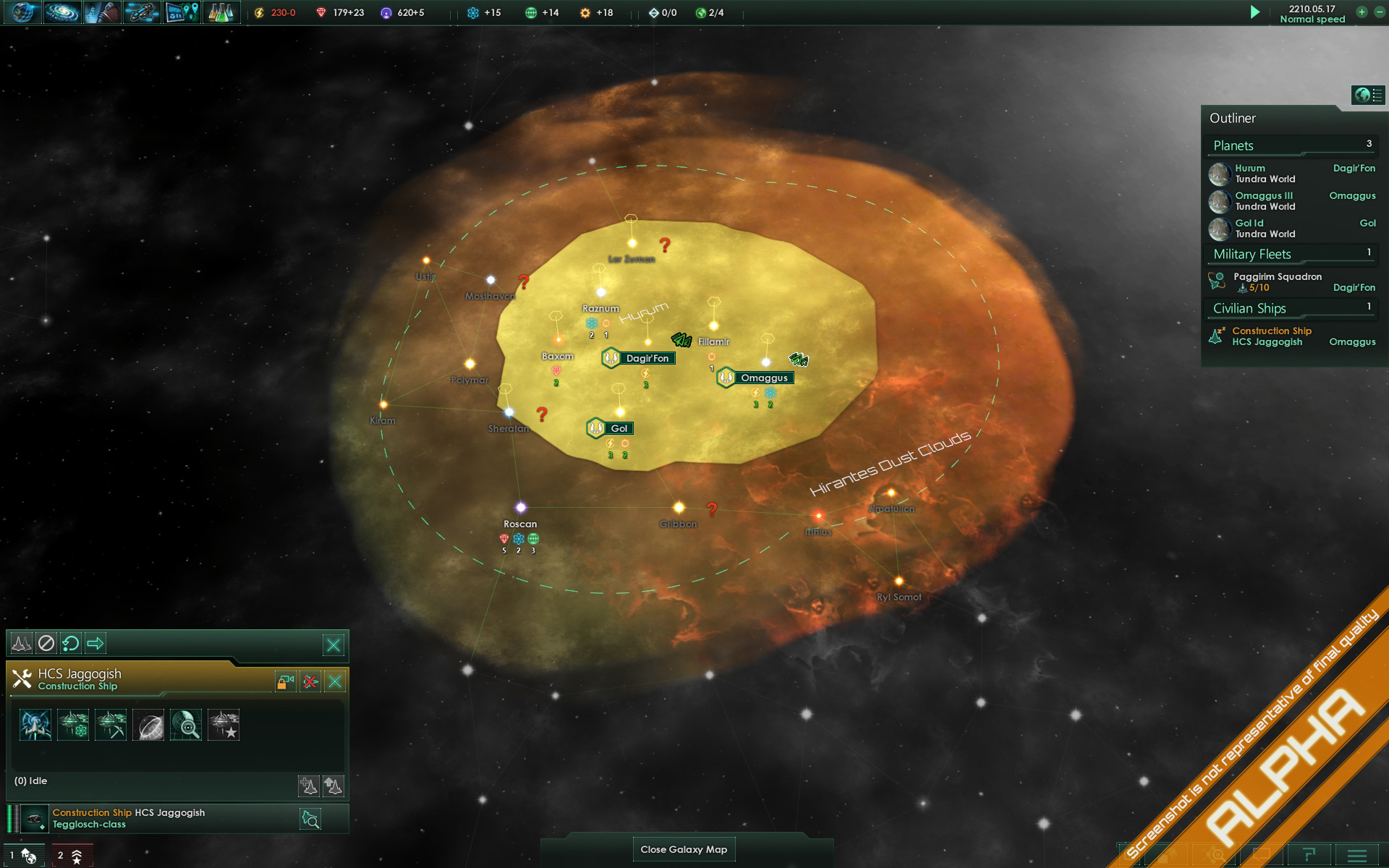Greetings Earthlings!
We have spoken earlier about how the galaxy is generated, and today I aim to expand on that somewhat by telling you about the planets and how they differ from each other.
Planet Tiles
Each habitable planet has a number of tiles on its surface, representing the planet’s size. Some tiles might be blocked by natural barriers, such as mountains, and can be cleared to open up new space. When the galaxy is generated, each tile generates a random number and checks if a deposit will be spawned there. A tile can be worked by having a Pop placed in it.
Buildings can also be constructed in tiles, and they often have adjacency bonuses for the resource they are producing. Therefore it will be advantageous to construct your power plants in proximity to each other, to achieve optimal efficiency.

Planet Modifiers
Celestial objects come in many different sizes and shapes, and planet modifiers are a part of what can set two planets apart. In the example above, Omaggus III has particularly large lifeforms on it, which could prove fruitful to study.
Deposits
Resources are generated as deposits and they spawn on planets depending on the type of planet, and which modifiers can be found on the planet. Certain resources are also more likely to be found in systems that lie in specific parts in the galaxy, like inside a nebula. All resources cannot appear on all planets, and some planets have a higher chance of hosting certain resources. Asteroids are very likely to have minerals on them, for example.

Orbital Resources
Planets that cannot be colonized do not use surface tiles, but they can still generate deposits. Each planet has an orbital resource slot that can be worked if a Mining Station or Research Station is built in orbit around that planet. Sometimes you encounter planets that you could potentially colonize, but that is not habitable enough for you to want to colonize it. In those cases you may also want to construct an orbital station.
The Basic Resources
 Food is a requirement for Pops to grow. If there is plenty of Food, Pops will grow faster. If there is a lack of Food, Pops will be unhappy.
Food is a requirement for Pops to grow. If there is plenty of Food, Pops will grow faster. If there is a lack of Food, Pops will be unhappy.
 Minerals are used to produce most things in the game. If Minerals represent matter, Energy Credits represent work.
Minerals are used to produce most things in the game. If Minerals represent matter, Energy Credits represent work.
 Energy Credits represent all liquid assets and energy produced by our Empire. Actions, such as clearing tiles, cost Energy Credits to perform. This resource is mainly used for upkeep, and although it can be hoarded, that might not be the best way of handling it.
Energy Credits represent all liquid assets and energy produced by our Empire. Actions, such as clearing tiles, cost Energy Credits to perform. This resource is mainly used for upkeep, and although it can be hoarded, that might not be the best way of handling it.


 Physics Research, Society Research and Engineering Research are used to advance technologies in different fields of science.
Physics Research, Society Research and Engineering Research are used to advance technologies in different fields of science.

Here, have a bonus screenshot! As an interstellar rogue I'm used to breaking the rules.
Join us again next week when we will be telling you about Rare Resources and the Spaceport.
We have spoken earlier about how the galaxy is generated, and today I aim to expand on that somewhat by telling you about the planets and how they differ from each other.
Planet Tiles
Each habitable planet has a number of tiles on its surface, representing the planet’s size. Some tiles might be blocked by natural barriers, such as mountains, and can be cleared to open up new space. When the galaxy is generated, each tile generates a random number and checks if a deposit will be spawned there. A tile can be worked by having a Pop placed in it.
Buildings can also be constructed in tiles, and they often have adjacency bonuses for the resource they are producing. Therefore it will be advantageous to construct your power plants in proximity to each other, to achieve optimal efficiency.

Planet Modifiers
Celestial objects come in many different sizes and shapes, and planet modifiers are a part of what can set two planets apart. In the example above, Omaggus III has particularly large lifeforms on it, which could prove fruitful to study.
Deposits
Resources are generated as deposits and they spawn on planets depending on the type of planet, and which modifiers can be found on the planet. Certain resources are also more likely to be found in systems that lie in specific parts in the galaxy, like inside a nebula. All resources cannot appear on all planets, and some planets have a higher chance of hosting certain resources. Asteroids are very likely to have minerals on them, for example.

Orbital Resources
Planets that cannot be colonized do not use surface tiles, but they can still generate deposits. Each planet has an orbital resource slot that can be worked if a Mining Station or Research Station is built in orbit around that planet. Sometimes you encounter planets that you could potentially colonize, but that is not habitable enough for you to want to colonize it. In those cases you may also want to construct an orbital station.
The Basic Resources

Here, have a bonus screenshot! As an interstellar rogue I'm used to breaking the rules.
Join us again next week when we will be telling you about Rare Resources and the Spaceport.


